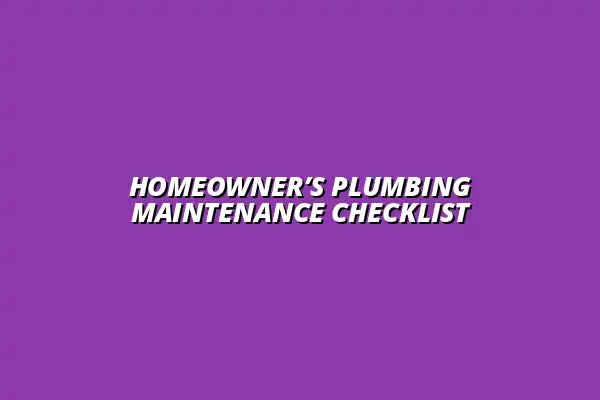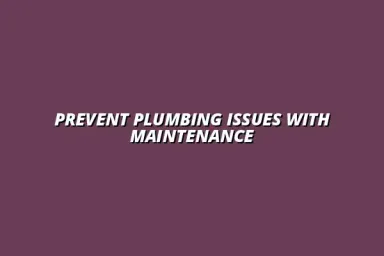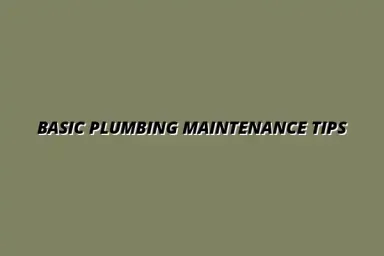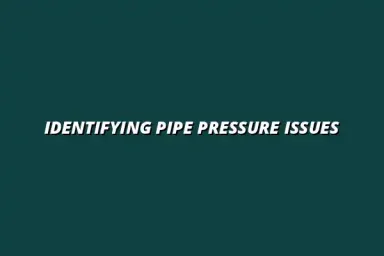Understanding the Importance of Preventive Plumbing Maintenance
When it comes to safeguarding our homes, preventive plumbing maintenance is a vital aspect we often overlook. It involves routinely checking and caring for the plumbing system to prevent future problems. By being proactive about plumbing issues, homeowners can save themselves from expensive repairs down the road.
Preventive plumbing maintenance is like a health check-up for your home’s plumbing. It ensures that everything is functioning properly and helps to identify any potential issues before they become serious headaches. This practice not only extends the life of your plumbing system but also contributes to a more efficient and safe home environment.
What is Preventive Plumbing Maintenance?
In simple terms, preventive plumbing maintenance refers to regular inspections and upkeep of plumbing systems to catch problems early. This could include checking for leaks, assessing water pressure, and replacing worn-out fixtures. By implementing a maintenance routine, homeowners can significantly reduce the risk of sudden plumbing failures.
One key component is to establish a consistent schedule for maintenance tasks. This might involve seasonal checks, such as preparing pipes for winter or ensuring outdoor faucets are functioning well in summer. These small steps can make a big difference in the long-term health of your plumbing system. For more comprehensive guidance on maintaining your home's plumbing, check out these plumbing maintenance tips for homeowners.
- Regular inspection of visible pipes and connections
- Checking water pressure and drainage
- Replacing worn fixtures and seals
Benefits of Regular Plumbing Checkups for Homeowners
Regular plumbing checkups have numerous benefits that go beyond simply fixing problems. Firstly, they can lead to cost savings and long-term benefits. By identifying issues before they escalate into major repairs, homeowners can save a significant amount of money on emergency plumbing services.
Additionally, regular maintenance enhances overall home safety and comfort. A well-maintained plumbing system reduces the risk of leaks, water damage, and even mold growth, which can pose health risks. It also ensures that water quality is consistently good, making daily tasks like cooking and cleaning worry-free.
Cost Savings and Long-Term Benefits
When you think about it, spending a little on routine maintenance can save you a lot in the long run. Here are some of the ways that preventive maintenance can help you save:
- Early detection of leaks can prevent costly water damage.
- Consistent maintenance can help optimize water usage, reducing your monthly bills.
- Replacing worn parts prevents larger, more expensive repairs.
Overall, these cost-saving benefits make a strong case for regular plumbing maintenance, supporting a healthier home environment. Learning how to prevent bathroom sink pipe clogs is a great place to start.
Enhancing Home Safety and Comfort
Home safety is another crucial reason for maintaining your plumbing system. A small leak can lead to significant damage if left unchecked, impacting the safety of your home. Ensuring that all plumbing components are in good condition gives you peace of mind.
Your family's comfort is also tied to a well-functioning plumbing system. From taking warm showers to ensuring clean water for drinking and cooking, having reliable plumbing contributes to a quality lifestyle. Regular maintenance helps ensure that these essential services are uninterrupted. For example, annual inspections of your water heater, as described in this guide, can dramatically extend its life and safety.
Key Elements of a Comprehensive Plumbing Maintenance Checklist
To make the most out of preventive plumbing maintenance, having a comprehensive checklist is essential. This checklist serves as a roadmap to guide homeowners through the necessary tasks, ensuring nothing is overlooked. A good checklist will help streamline the process and keep your plumbing in top shape.
Each element of your checklist should focus on key areas of plumbing maintenance, including inspections, evaluations, and seasonal tasks. Let's break down some of the crucial components you should include!
Inspecting Visible Pipes and Connections
One of the first steps in any plumbing maintenance routine is inspecting all visible pipes and connections. This includes checking for signs of leaks, corrosion, and other damage. Keeping an eye on these components can help you spot issues before they escalate. If you discover significant damage, understanding when to repair or replace your pipes is crucial.
Looking for signs of wear and tear is essential. Some common issues to look out for are:
- Rust or corrosion on metal pipes
- Moisture around pipe joints
- Unusual noises or water pressure changes
Signs of Wear and Tear to Look For
Identifying the signs of wear and tear early can save homeowners from bigger problems later. Look for:
- Cracks or bulges in pipes
- Discoloration or water spots on walls and ceilings
- Slow drains or gurgling sounds in the plumbing
These signs indicate that it's time to take action before they lead to severe issues.
How to Address Minor Issues Before They Escalate
Addressing minor plumbing issues promptly can prevent them from becoming costly repairs. Simple tasks such as tightening loose fittings, replacing worn washers, and using sealants on minor leaks can be done without professional help. However, always know your limits!
If you encounter a problem that seems beyond your expertise, it’s best to call a professional plumber. For those in the Birmingham area, consider this plumber in Billesley, Birmingham. The key is to act swiftly and not let small problems turn into major headaches.
Evaluating Fixtures and Appliances
Next, it’s essential to pay attention to your fixtures and appliances. Regularly evaluating faucets, showerheads, and appliances like dishwashers can help spot any potential issues. Taking the time to check these can save you from unexpected breakdowns.
Start by checking for any visible leaks or water stains around sinks and tubs. This will give you a clear picture of the condition of your fixtures. Remember, a little maintenance goes a long way! For specific advice on bathroom plumbing, see these essential bathroom plumbing maintenance tips.
Checking Faucets and Showerheads for Leaks
Leaks in faucets and showerheads can waste a significant amount of water. Regular checks can help you catch and fix these issues quickly. Signs of a leak include:
- Dripping water from the faucet or showerhead
- Water pooling around the base of the fixture
- Changes in water pressure
By fixing these leaks promptly, you contribute to water conservation and save on your utility bills!
Assessing Water Heaters and Dishwashers
Your water heater and dishwasher also need regular maintenance. For water heaters, check for leaks, corrosion, and sediment buildup. Flushing your water heater annually can improve efficiency and extend its lifespan.
For dishwashers, ensure that hoses are secure and free of cracks. Regularly check filters and clean them to maintain peak performance. These small checks can lead to better efficiency and help avoid costly repairs in the future.
Common Plumbing Issues and How to Prevent Them
When it comes to plumbing, some issues tend to pop up more often than others. Understanding these common problems can help homeowners take proactive steps to prevent them. In this section, we'll explore the frequent plumbing issues that can disrupt your home and how to keep them at bay!
One of the most notorious plumbing troubles is clogged drains. They can lead to water backing up, unpleasant odors, and even costly repairs. Let's dive into some practical solutions to keep your drains flowing smoothly!
Clogged Drains and How to Avoid Them
Clogged drains can be a real headache, but with some simple habits, you can avoid this common issue. It’s crucial to be mindful of what goes down the drain. Here are a few best practices that can help:
- Use Drain Screens: These can catch hair, food scraps, and other debris.
- Regularly Flush Pipes: Pouring hot water down your drains can help dissolve grease buildup.
- Avoid Chemical Cleaners: They can damage your pipes over time; instead, opt for natural solutions.
By following these practices, you can significantly reduce the chances of experiencing clogs. For additional preventative measures, consult these tips on preventing bathroom sink pipe clogs.
Best Practices for Preventing Clogs
In addition to regular maintenance, adopting certain habits can further prevent clogs in your plumbing system. Here are some effective tips:
- Dispose of Grease Properly: Always throw grease in the trash instead of pouring it down the sink.
- Clean Your Drains: Regularly use a mixture of baking soda and vinegar to keep drains clear.
- Be Mindful of Water Usage: Avoid overwhelming your drains with too much water at once.
Taking these steps could save you from a future plumbing disaster! Now that we’ve tackled clogs, let’s shift our focus to water quality and how it affects our plumbing systems.
Water Quality and Its Impact on Plumbing Systems
The quality of water in your home can greatly influence the health of your plumbing. Hard water, which is full of minerals, can lead to buildup and reduce the lifespan of your pipes and fixtures. Understanding the difference between hard and soft water is essential for maintaining your plumbing!
Homeowners should consider testing their water quality regularly. This can help identify any issues early on. Let’s break down the characteristics of hard and soft water!
Understanding Hard Water vs. Soft Water
Here's a quick overview of the two types of water and their implications:
| Feature | Hard Water | Soft Water |
|---|---|---|
| Mineral Content | High (calcium, magnesium) | Low (sodium) |
| Effects on Plumbing | Causes scale buildup | Gentler on pipes |
| Soap Efficiency | Less effective | More effective |
Understanding these differences can help you make informed decisions regarding your plumbing maintenance! Installing water softeners can also be a great long-term solution.
Installing Water Softeners for Long-Term Health
If you have hard water, consider installing a water softener. This device can reduce mineral content and protect your plumbing system. Here are some benefits of having one:
- Reduces Scale Buildup: Keeps pipes and appliances clean and running efficiently.
- Improves Appliance Lifespan: Soft water can extend the life of your water heater and dishwasher.
- Better Soap Performance: Soft water helps soap lather better and cleans more effectively.
Taking action now can lead to healthier plumbing and savings in the future! Now that we’ve discussed common issues, let’s move on to some frequently asked questions about preventive plumbing maintenance.

 Kiran Almasi
Kiran Almasi

